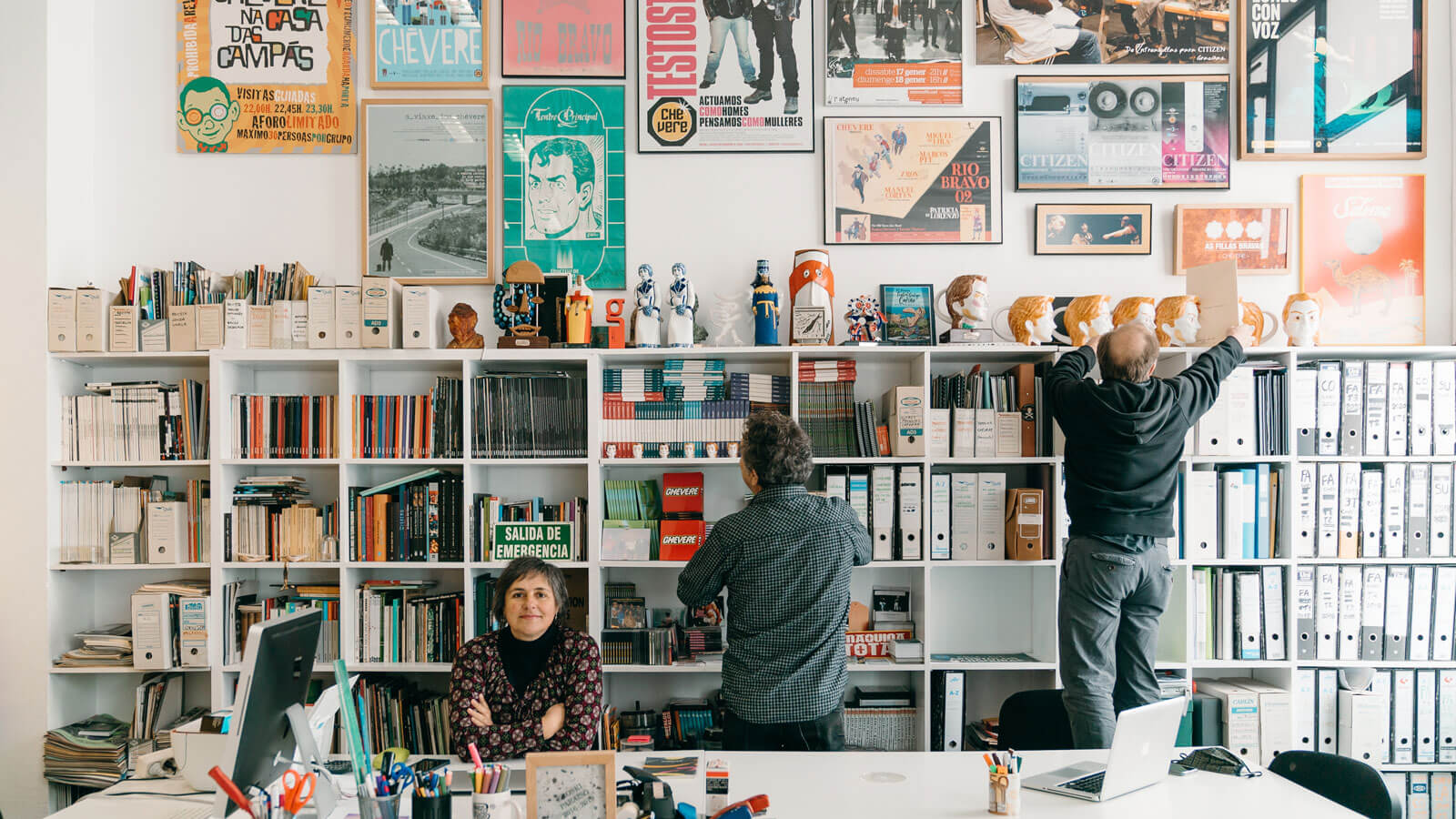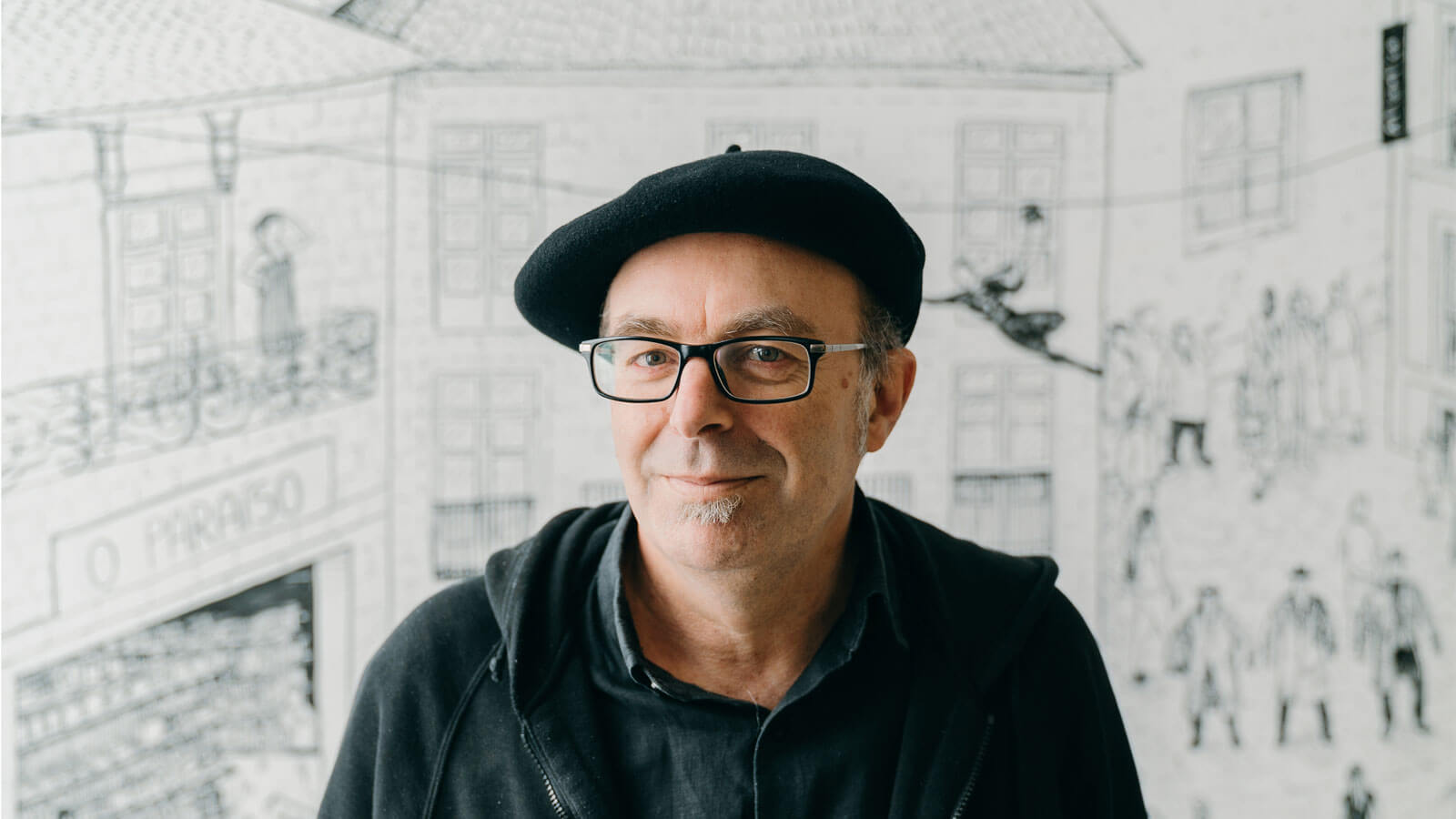Creation
Chévere
Chusa Pérez
Dramaturgy and direction
Cast
Ángela Ibáñez, Patricia de Lorenzo and Chusa Pérez
Lighting
Fidel Vázquez
Sound designer
Xacobe Martínez Antelo
Audiovisual space
Lucía Estévez
Creation Chévere Original idea Chusa Pérez Dramaturgy and direction Xron
15 MAR – 7 APR 2024
Tuesday to Sunday at 18:00 | Duration: to be determined Meeting with the artistic team: 21 MAR 2024 Show in sign language (LSE) and spoken language (Galician and Spanish) with surtitles in Spanish.
FIRST WEEK DISCOUNT(50% discount): Tuesday 19 and Thursday 21 MAR
Please arrive well in advance as the auditorium will be closed once the performance has begun.
To collect your tickets, our ticket offices will be open from Monday to Sunday from 14:30 to 20:30.
Chévere
Chusa Pérez
Ángela Ibáñez, Patricia de Lorenzo and Chusa Pérez
Fidel Vázquez
Xacobe Martínez Antelo
Lucía Estévez

Synopsis
Helen Keller is an American woman, placed outside the norm from the age of nineteen months when she became deaf and blind and unable to speak due to an illness. She went on to become a global celebrity as the first deaf and blind person to obtain a university degree in 1904. Her life was fixed in the collective memory as an example of self-improvement and most of her writings were retained as simple motivational aphorisms. It is thus necessary to illuminate and re-stage her heterodox commitment to equality and social justice in order to make her words resonate today. Perhaps Helen Keller’s main disadvantage was not her loss of sight and hearing, but her belonging to a society designed for those who can see and hear, in which the marginal, the anomalous, the dissident, have little place. Like any exemplary person who challenges the hegemonic order, Helen Keller posed a threat to the powerful.
Director’s Note
This project was born following the discovery of the texts and political thoughts of Helen Keller, who in the early twentieth century took a critical and radical stance against the interventionist policies of the USA and military capitalism. Her example allows us to critically examine a new war in Europe between rival imperialist visions of the world.
Helen Keller is an American woman, placed outside the norm from the age of nineteen months when she became deaf and blind and unable to speak due to an illness. She went on to become a global celebrity as the first deaf and blind person to obtain a university degree in 1904. Her life was fixed in the collective memory as an example of self-improvement and most of her writings were retained as simple motivational aphorisms. It is thus necessary to illuminate and re-stage her heterodox commitment to equality and social justice in order to make her words resonate today. Perhaps Helen Keller’s main disadvantage was not her loss of sight and hearing, but her belonging to a society designed for those who can see and hear, in which the marginal, the anomalous, the dissident, have little place. Like any exemplary person who challenges the hegemonic order, Helen Keller posed a threat to the powerful.
This is therefore a project about rebellion and dissidence and against silence. About rebellious and dissident women who broke their silence. Helen Keller’s radical thinking and the critical dimension of her life are also an example of rebellion against the so-called American miracle. An example of anti-capitalist dissidence, challenging the logic of the miracle by taking the side of the most vulnerable against war and exploitation, militating in socialist and revolutionary organisations in a country that made the struggle against communism a raison d’être.
But this is also a work about language, which seeks to question the lack of communication between hearing and non-hearing people, between “normal” and “different” people, integrating spoken language and sign language in the same work.
Xron
Chévere
Chusa Pérez
Ángela Ibáñez, Patricia de Lorenzo and Chusa Pérez
Fidel Vázquez
Xacobe Martínez Antelo
Lucía Estévez

Chévere is a theatrical agitation company that has dedicated over 30 years to producing dramatic works through a natural, irreverent and genuine approach. In 2014, it received the National Theatre Award for its social and cultural commitment and consistent contribution to collective creation, transgression of genres and critical connection with reality.
View more
Chévere has a core artistic group (Miguel de Lira, Xesús Ron and Patricia de Lorenzo) and collaborates with dozens of professionals from different geographic, generational and creative backgrounds. By using humour as a philosophy and laughter as an expression, its works bring current debates to the stage, documenting these issues through performance in a contemporary language accessible to a wide range of audiences. Examples of this approach include recent works such as Curva España (2019), Eroski Paraíso (2016), Testosterona (2009), La trilogía Citizen (2010-2011), Eurozone (2013), Ultranoite no País dos Ananos (2014) and As Fillas Bravas (2015 and 2020).
Chévere created the Nave de Servizos Artísticos-Sala NASA in 1992, a unique independent cultural space, and was in charge of artistic direction until it closed in late 2011, precipitated by the persecution of the local PP government. This space served as the group’s headquarters for 20 years, providing a platform for a significant part of the city’s cultural activity and countless stage projects, groups and writers who represent the most innovative creations of this period in Galicia and Spain.
© Leticia Blanco

Xron (Vigo, 1965) is an actor, playwright, director and ideologist.
Since joining Grupo Chévere in 1988, he has been involved in all the company’s projects. He has worked in scriptwriting, theatrical production, acting, dramaturgy and artistic and stage direction.
View more
His latest works are: Curva España (2019), Divinas Palabras Revolution (2018), Anatomía de una sirena (2018), Eroski Paraíso (2016) and Goldi Libre (2016). In 1992, he participated in the creation of the Nave de Servizos Artísticos-Sala NASA (Artistic Services Warehouse-Nasa Hall), heading up the management and artistic direction until 2011. He was a member of the board of directors of Red de Teatros Alternativos (Alternative Theatre Network) (1999-2003), Escena Galega (2015-2018) and Consello Asesor do Centro Dramático Galego (Advisory Board of the Galician Centre for Dramatic Arts) (2006-2009). He formed part of the Burla Negra Collective and the Nunca Máis Platform, participating in the creation and development of cultural agitation projects such as “O País de Nunca Máis”, “Foro Negro da Cultura” and “Hai que botalos”. In 2010, he was involved in the creation of the digital platform for cultural content Redenasa.tv. He also directed the Chévere theatre residency programme in Teo (2012-2019) and the A Berberecheira stage creation laboratory (2016-2020).
© Leticia Blanco
